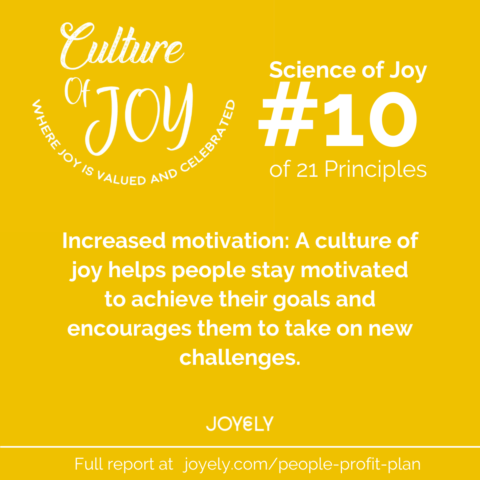Studies have shown that when employees experience joy, their motivation increases. This is because joy activates areas of the brain associated with reward and motivation, such as the nucleus accumbens, ventral tegmental area, and amygdala (Mehta, 2018). For example, a 2017 study by the University of Missouri-St. Louis found that positive emotions reduce activity in the amygdala, leading to lower levels of stress and anxiety.
One study is “Positive emotions and job satisfaction as predictors of work engagement” by Tims, Bakker, and Derks. This study found that employees who reported higher levels of positive emotions and job satisfaction were more likely to be engaged in their work and have higher levels of motivation.


Another study is “The role of positive emotions in positive psychology” by Fredrickson, Tugade, Waugh, and Larkin. This study found that positive emotions, such as joy, broaden people’s thinking and increase their ability to think creatively, which can lead to increased motivation to take on new challenges and achieve goals.
Additionally, the study “Positive affect and psychological well-being” by Diener, Lucas, and Oishi found that people who reported higher levels of positive affect (which includes joy) had higher levels of motivation and goal attainment.
What we do at JOYELY in our corporate programs offers products and services that promote joy in the workplace. The Culture of Joy programs offer team-building activities, wellness programs, and training sessions on work-life integration. We make sure all interactions are engaging, interactive, fun, and relatable, as well as easy and simple to understand.
JOYELY’s Chair of Joy Experience and specialized joy-enhancing techniques help increase productivity and build upon profitability strategies while decreasing turnover. We do all this while creating a healthier and more successful business.
Each company we work with is unique! At JOYELY, we consider the needs and values of each corporation we decide to work with. For example, we pay particular attention to the company mission and make sure there is an alignment of our approach and joy with the company’s mission or values.
Overall, we clearly communicate with corporations the extreme value of joy and the powerful science that backs a Culture of Joy. Our own unique research is outlined in the article, 21 Science-Based Reasons Why a Culture of JOY Is the Most Important Decision Your Company Can Make in 2023 will begin to create great results quickly.
We offer a 1–2-hour complimentary COJ Experience to select companies as an example of the Year of Joy Corporate Program.
Simply reach out to our JOYELY Team at www.joyely.com or you are welcome to connect with our founder, Sheryl Lynn at 949-303-5219 or sheryl@joyely.com
It’s time to immerse ourselves completely in the conversation of joy, to prioritize it above most things.. There’s no time to wait; it’s a matter of life and death.
Your Answer Matters!


We invite you to share your valuable experience. Your feedback not only guides future guests but also illuminates our path towards excellence. Please take a moment to leave a review and help shape our journey forward.



Welcome to JOYELY, where JOYELY Ever After is not just a dream, it’s our lifestyle.
© 2024 JOYELY. All Rights Reserved.